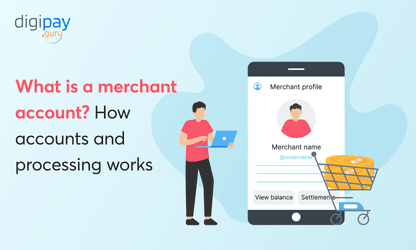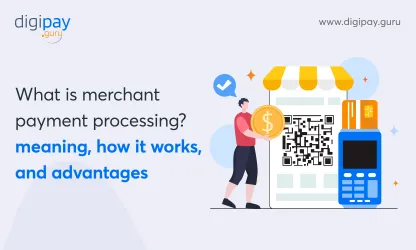In today's digital age, the process of making and receiving payments has become increasingly complex. Merchant Payment Solutions refer to the technologies and services that enable merchants to accept payments from their customers seamlessly and securely. From traditional point-of-sale (POS) systems to mobile and online payment platforms, these solutions play a crucial role in the success of any business.
But, the rapid growth in the use of digital payment solution has also led to an increase in security threats and cybercrime. Ensuring the security of customer data and adhering to industry regulations are key concerns for merchants.
According to research by Grand View Research, the global payment fraud market is expected to reach up to 40.62 billion US dollars by 2027. And with sensitive financial information being transmitted and stored through these solutions, it's crucial for merchants to choose a payment solution that prioritizes security and compliance.

In this blog, we will discuss valuable insights and best practices to empower merchants to make informed decisions when selecting a payment solution that can protect their business and their customers.
Understanding Security and Compliance
What is Security in Merchant Payment Solutions?
Security in Merchant Payment Solutions refers to the measures taken to protect sensitive financial information from unauthorized access, theft, or abuse. From the encryption of sensitive data to multi-factor authentication, security is critical in ensuring the protection of customer information and the integrity of transactions.
What is Compliance in Merchant Payment Solutions?
Compliance refers to the adherence to industry regulations and standards that govern the handling of customer information and transactions. For example, the Payment Card Industry Data Security Standard (PCI DSS) is a set of requirements that apply to organizations accepting, processing, or storing payment card information.
Compliance with these standards helps to protect customer information, reduce the risk of data breaches, and increase the trust of customers in a business.
The intersection of Security and Compliance in Merchant Payment Solutions
Security and compliance go hand-in-hand in ensuring the protection of customer information in merchant solutions for payments. A payment solution that is secure but not compliant with industry regulations is not enough, as it may still be vulnerable to data breaches or other security threats.
On the other hand, a payment solution that is compliant but lacks proper security measures is also not enough, as it may still be at risk of data breaches or security incidents. It's crucial for merchants to choose a payment solution that is both secure and compliant to ensure the protection of their customer's information and the success of their business.
Factors to Consider when Evaluating Security and Compliance of Merchant Payment Services and Solutions:
Payment Card Industry Data Security Standard (PCI DSS)
The Payment Card Industry Data Security Standard (PCI DSS) is a set of security standards designed to ensure that all companies that accept, process, store, or transmit credit card information can secure your online payment system.
Looking at the ongoing trends in merchant payment solutions, it’s crucial for merchants to choose a payment solution that is PCI DSS compliant, as non-compliance can result in costly fines and damage to a business's reputation. The PCI DSS can be an effective solution for online payment security, especially for small businesses that can’t afford even an ounce of data or goodwill damage.
Read More: How online payment solution can help small businesses
Security Measures Implemented by the Merchant Payment Solution Provider
The security measures implemented by a Merchant Payment Solution provider can vary greatly, from encryption and multi-factor authentication to regular security audits and penetration testing. Merchants need to understand the security measures implemented by their payment solution provider and assess their effectiveness in protecting customer information.
Data Privacy Regulations
Data privacy regulations, such as the General Data Protection Regulation (GDPR) and the California Consumer Privacy Act (CCPA), are designed to protect customer information and give individuals greater control over their data.
Merchants need to choose a payment solution that complies with these regulations, as non-compliance can result in significant fines and legal consequences.
Incident Response and Disaster Recovery Plans
The exceptional security features of merchant Payment Solution are susceptible to security incidents and natural disasters, and merchants must have a plan in place to respond to these incidents effectively.
A well-designed incident response and disaster recovery plan can help minimize the damage caused by a security breach or natural disaster and ensure that the payment solution can quickly recover and resume normal operations.
When evaluating a Merchant Payment Solution, merchants should consider the provider's incident response and disaster recovery capabilities, including their plans, procedures, resources, and merchant services.
Best Practices for Evaluating Security and Compliance of Merchant Payment Solutions
Conduct a Risk Assessment
A risk assessment helps merchants understand the potential security issues on Merchant Payment Solution and determine the measures necessary to mitigate those risks. Merchants need to conduct a risk assessment of their payment solution to identify any vulnerabilities and ensure that they are protected against potential security threats.
Review the Provider's Compliance Certifications and Accreditations
Compliance certifications and accreditations, such as PCI DSS, demonstrate a Merchant Payment Solution provider's commitment to security and compliance. Merchants should review the provider's certifications and accreditations to ensure that their payment solution is compliant with relevant industry standards and regulations.
Evaluate the Provider's Security Measures and Policies
Security measures and policies implemented by a Merchant Payment Solution provider play a critical role in protecting customer information. Merchants should evaluate the provider's security measures and policies that can provide top-notch security in transactions to ensure that they are robust and effective in protecting against security threats.
Boost your payment solution with DigiPay’s top-notch payment security systems
Assess the Provider's Incident Response and Disaster Recovery Capabilities
A well-designed incident response and disaster recovery plan can help minimize the damage caused by a security breach or natural disaster and ensure that the payment solution can quickly recover and resume normal operations.
Merchants should assess the provider's incident response and disaster recovery capabilities, including their plans, procedures, and resources, to ensure that they are prepared to respond to security incidents and disasters effectively.
Final Thoughts
Security and compliance are critical factors to consider when choosing a Merchant Payment Solution. By following best practices for merchant payment solutions such as conducting a risk assessment, reviewing compliance certifications, evaluating security measures and policies, and assessing incident response and disaster recovery capabilities, merchants can ensure that their payment solution is secure and compliant.
At DigiPay.Guru, we understand the importance of security and compliance in Merchant Payment Solutions, and we are committed to providing advanced and secure payment solutions that meet the highest standards.
Our solutions are designed with security and compliance in mind and are backed by robust security measures and policies, as well as a comprehensive incident response and disaster recovery plan.




